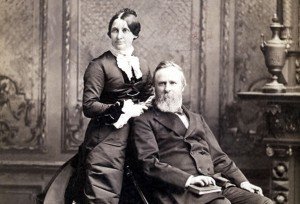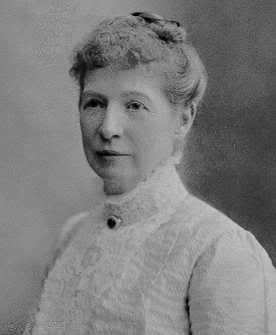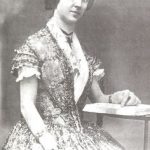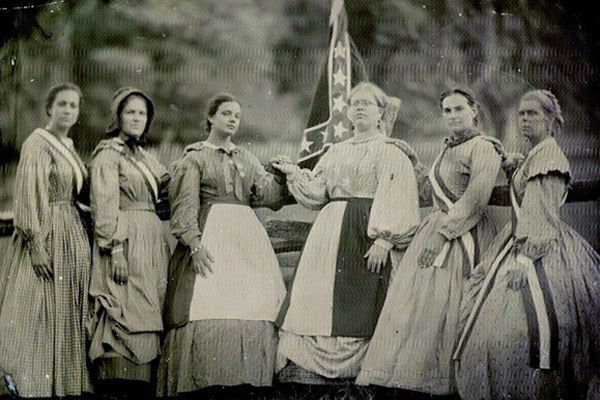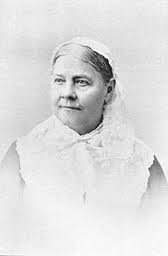A Civil War Love Story
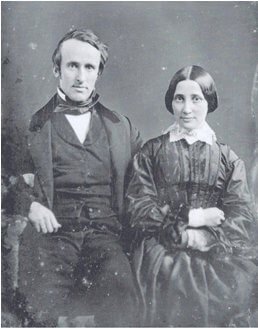 Born August 28, 1831 in Chillicothe, Ohio, Lucy Ware Webb was the daughter of physician James Webb and Maria Cook Webb. When Lucy was two years old, her father died of cholera while on a trip to Lexington, Kentucky to free slaves he had inherited from his aunt. Lucy developed strong abolitionist convictions from her father and grandfather, both of whom were slaveholders at one time.
Born August 28, 1831 in Chillicothe, Ohio, Lucy Ware Webb was the daughter of physician James Webb and Maria Cook Webb. When Lucy was two years old, her father died of cholera while on a trip to Lexington, Kentucky to free slaves he had inherited from his aunt. Lucy developed strong abolitionist convictions from her father and grandfather, both of whom were slaveholders at one time.
Image: Lucy and Rutherford B. Hayes
Wedding photograph, December 30, 1852
In 1844 Maria Webb moved her family to Delaware, Ohio, where Lucy’s brothers enrolled at Ohio Wesleyan University. Lucy first met Rutherford Birchard Hayes on the Ohio Wesleyan campus in 1847. Later that year, Lucy enrolled at Wesleyan Female College in Cincinnati, Ohio, from which she graduated with honors in 1850. Hayes was by this time practicing law in Cincinnati, and he began courting Lucy.
In his diary – he kept diaries faithfully throughout his life – Rutherford noted that when he first expressed his love for her:
She did not comprehend it… I waited, perhaps repeated… until she said, “I must confess I like you very well” – in a queer, soft, lovely tone, it stole to the very heart. And I, without loosening her hand, took a seat by her side. … An hour later Lucy finally said, “I don’t know if I am dreaming. I thought I was too light and trifling for you.”
Marriage and Family
Rutherford proposed in June 1851. After an engagement of a year and a half, Lucy Webb married Rutherford B. Hayes December 30, 1852. She was 21; he was 30. They lived for a while with Lucy’s mother before buying a home in Cincinnati. Shortly after their wedding, Rutherford wrote, “A better wife I never hoped to have. This is indeed the life… Blessings on his head who first invented marriage.”
The couple were extraordinarily close throughout their marriage, even as they began having children. Three sons died in early childhood. Five of their eight children lived to adulthood: Birchard Austin (1853), Webb Cook (1856), Rutherford Platt (1858), Fanny (1867) and Scott (1871). For more than twenty years, Lucy was occupied mostly with their children, while Hayes practiced law with an eye on politics.
Civil War
While Hayes served in the 23rd Ohio Infantry Regiment, Lucy volunteered as a nurse in local hospitals. He served with honor during the war, saw heavy fighting, was wounded on several occasions, and reached the rank of Major General of volunteers by the time he left the army.
A letter from Lucy to her soldier:
Chillicothe Aug 13 1862
Dearest R.
Received your letter of the 7th so glad to hear from you… Yesterday as I read an article in the Commercial reviewing your Virginia Campaign- I could not help taking a good cry… in your excitements, marches and various cares- your mind cannot always be on me- but I have no other thought- I hear ladies saying they could not endure the separation- and some who are parted now- are feeling almost in despair- but all my thoughts of you are loving happy remembrances of past joys- and a feeling of safety that God will preserve you- and that you are where duty calls…
But she would see him much sooner than she thought. A musket ball struck Hayes at the Battle of South Mountain, September 14, 1862. When the news reached Lucy, she went first to Washington, DC and then to Middletown, Maryland, where she nursed him back to health.
Lucy continued to visit her husband’s encampments aas often as possible, helping in field hospitals, and sewing and cooking for many of those who served under her husband. For her kindness and loving care, Rutherford’s men called her Mother of the Regiment. The work she did in the Civil War inspired her to actively advocate for reforms in the care of the mentally ill, orphans and the homeless.
Hayes in Politics
In 1864, while still in the U.S. Army, Rutherford B. Hayes was elected to Congress, although he refused to campaign while in uniform. He won the election but remained in the Army, refusing to take his seat in the House of Representatives until the Union won the war. Lucy knew he loved politics and believed this was a turning point for him.
In 1866, Hayes was reelected to Congress, and the following year, voters elected him Governor of Ohio, a position he held for two terms (1868-1872). He refused to break precedent and seek a third consecutive term, but he was elected again four years later.
Lucy was greatly interested in her husband’s political career. While Hayes was serving in the House of Representatives, Lucy worked for the welfare of children and veterans in Washington, DC. While he was governor of Ohio, she raised money to build an orphanage for the children of Civil War veterans.
First Lady
After Hayes won the 1876 presidential election, the couple moved into the White House with small children in tow. The President, First Lady, and their five children were a loving family and often filled the hallways of the capital with sounds of laughter and children’s voices. It soon became obvious to all that there was a new, informal atmosphere at the Executive Mansion. The First Lady frequently opened the White House to members of Congress, Cabinet officials and diplomats and their families.
Lucy Webb Hayes brought her way of life to the White House, in a manner few others have done. Her family said grace at breakfast and sang hymns every Sunday evening. She held informal receptions, where guests were free to stroll around the rooms and the grounds and hosted popular social events, like the White House Easter Egg Roll, which became a tradition. Lucy loved animals, and at one time the White House was home to a mockingbird, two dogs, a goat, and the nation’s first Siamese cat.
On December 30, 1877, the First Couple celebrated their 25th wedding anniversary at the White House by renewing their wedding vows and hosting a reception for friends and family. The 46-year-old First Lady donned the same wedding dress she had worn a quarter-century earlier.
Lucy commissioned paintings of presidents who had not yet been honored by displaying their portraits on the walls of the White House. She also ordered a portrait of Martha Washington to hang next to that of George Washington. By the end of the Hayes term in office, Lucy was acclaimed the “most widely known and popular President’s wife the country has known.”
When Hayes accepted the nomination for President of the United States in 1876, he had stated that he would not seek a second term if elected. When the 1880 presidential election began, President Hayes was looking forward to retirement and gladly handed the Presidency over to James A. Garfield on March 4, 1881.
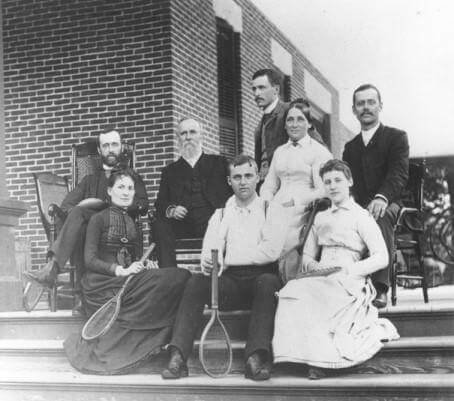
Image: Hayes Family at Spiegel Grove, Fremont, Ohio
Left to right: Birchard and his wife Mary, President Hayes,
Scott, Rutherford, the First Lady, Fanny and Webb
Credit: R.B. Hayes Presidential Center
Retirement
Rutherford B. Hayes inherited the 25-acre estate known as Spiegel Grove in Fremont, Ohio from his maternal uncle, Sardis Birchard, who had long admired the large wooded acreage. He named the property for the large puddles that collect beneath the towering trees during a storm. Spiegel is the German word for mirror, which describes these large reflecting pools of water. Birchard never married, and he intended for his nephew and family to reside there with him in his retirement.
Birchard kept the property in its natural state until 1859 when he began construction of a house on the property, anticipating that Hayes would soon return from Cincinnati and occupy it as his permanent home. However, these plans had to be deferred, first to four years of war, to the two terms Hayes served in Congress, and then to two terms as governor of Ohio. Therefore, Hayes was not able to return to his home at Spiegel Grove until 1873. However, after a respite of only four years, Hayes was elected President and moved in the White House.
Excerpt from the book Ware Genealogy:
Lucy’s passion for social harmony, which had marked her tenure as First lady, continued to influence her actions even after the family relocated… Unlike the glass-bowl atmosphere of the White House, where her every move could be observed, however, life in Spiegel Grove, surrounded by a loving family and friends, provided a reasonable degree of privacy and a sense of serenity.
After Hayes finally retired permanently from politics in 1881, he and Lucy spent their final years at the beloved estate that they had by then inherited, Spiegel Grove. In retirement, the former President was a strong advocate for access to education for all and prison reform. Lucy used her position as former First Lady to aid many charities.
Losing Lucy
Rutherford and Lucy had celebrated 36 happy years of marriage when he returned home from a board meeting at Ohio State University in Columbus on June 22, 1889. His son Rutherford came to his father and told him that Lucy had suffered an attack of paralysis about 4 o’clock p.m. Dr. Rice was then with Lucy. As he had done for most of his adult life, Hayes kept a diary through the days after Lucy’s stroke.
Dr. Rice … spoke with encouragement and confidence to Lucy. She was perfectly conscious but not able to speak. She was still in the chair. He [Dr. Rice] had her placed in the bed. … In her old manner, she pressed my hand and tried to smile…
June 23. Sunday.
The report of the attack published in the newspapers this morning has brought many dispatches from friends and acquaintances in all parts of the country. … Lucy is apparently more difficult to arouse. … when Dr. Rice tried to awaken her so she could swallow her medicine, I think she failed to swallow it. But she had life in her eyes and face. … She still grasps my hand, I think intelligently and with the old affection. This at 7 a.m.June 24. Monday, 4:40 A.M.
The end is now inevitable. I can’t realize it… Now, more than three days since the attack finds her much in the same condition she has been since the first day. We wait. Letters and dispatches come from all quarters – full of words that sustain and encourage.June 24-25, 1889.
It is past midnight, almost one o’clock. We do not expect Lucy to see the light of another day. All of our children, Birchard, Webb, Rutherford, Fanny, and Scott, are waiting for the inevitable close. … We have the best assurance that all will be done and has been done that man can do to save the dear one, and to smooth her way into the unknown if that is to be …If ever a man or woman found exquisite happiness in imparting happiness to others, the dear companion of my life, my Lucy, is that woman. Should I not be full of joy and gratitude for the good fortune which gave me her? Few men in this most important relation of life have been so blessed as I have been. From early mature manhood to the threshold of old age I have enjoyed her society in the most intimate of all relations. How all of my friends love her! My comrades of the war almost worship her.
June 25. Tuesday.
Lucy died without pain this morning at 6:30. All were present. I held her hand and gazed upon her fine face to the last; when, kissing her goodbye as she left the earth, I joined the dear daughter and the other children in walking on the porch in the bracing air of the lovely morning.
Lucy Webb Hayes was 57 years old when she died on June 25, 1889 and was buried at Spiegel Grove. Upon her death, flags across the United States were lowered to half-staff.
The former President noted in his diary on June 26, 1889 that the newspapers mentioned his beautiful home at Spiegel Grove. But it did not hold the same meaning for him it once did. “Yes, it is, in its own plain, homelike, and sensible way, a beautiful home, but I now begin to realize that the soul has left it.”
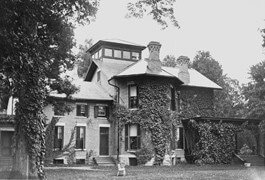 Image: Spiegel Grove in 1888
Image: Spiegel Grove in 1888
Fremont, Ohio
Rutherford B. Hayes’ heart gave out, and he passed away on January 17, 1893. As he was dying in the arms of his son Webb, the 19th President said, “I know that I am going where Lucy is.” He was buried beside her at Spiegel Grove.
SOURCES
Ware Genealogy
Wikipedia: Lucy Webb Hayes
Civil War Letters of Lucy Webb Hayes
History.com: Rutherford B. Hayes marries Lucy Webb
Dead Presidents: “My Lucy”: Rutherford B. Hayes Loses His Love
